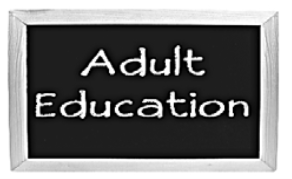By Sabrina Chartrand | Observer Reporter

The Adult Basic Education (ABE) Transition to Community College Program at MWCC has become a pathway for many adults who were unable to graduate from high school and enter into post-secondary education successfully.
At MWCC, adults who did not receive a high school diploma can prepare to take the GED exam with the help of the ABE staff which is critical for a student’s further education. According to Pamela Dempsey-O’Connell, an ABE site coordinator and counselor, “It’s becoming harder and harder to get a really good job without a high school diploma or GED.”
Dempsey-O’Connell also said that many adult students take the GED exam, fail and are then ready to take the classes. She says that after they have failed, they realize that they need the coaching the adult learning center provides.
After passing the GED exam, students can then apply to the ABE Transition Program, and once accepted, students take a placement exam which places them in basic classes. After students take the placement exam, they have appointments with a resource specialist who focuses on them during their first semester in the program. “We try to make it work for them to pursue their education and stay committed to their prior commitments,” Deb Bibeau, director of the Gateway to College and ABE Transition Programs said.
During the first semester in the program, students take a basic reading, writing and math course as well as a first semester seminar. Then, during the second semester, students begin to take college career courses, and work towards a diploma in their desired field of study.
As a counselor, Dempsey-O’Connell primarily helps students throughout the GED preparation program, and then helps them enter into the ABE Transition Program. For example, Dempsey-O’Connell helped Renee Chandler, an ABE Transition student, throughout the GED process, and she introduced Chandler to Luis Uribe, a resource specialist.
Chandler’s experience began when she received her GED at MWCC. After she received her GED, she had no plan to go to college. But, once she spoke with Uribe, he told her that the ABE staff would help her through the entire process, and he convinced her to apply.
Once Chandler was accepted, she took the placement exam and began her first semester of basic courses. During this semester, her classes were taught by teachers that were specific to the ABE Program, and she had frequent meetings with Uribe. At the end of the first semester, Chandler met with him to discuss and decide upon her college career path.
During the second semester, Chandler began taking classes that were relevant to her double-major in human services and complementary health care. “This program gave me opportunities where I didn’t think I had any, and that’s important,” Chandler said. “I probably wouldn’t have come back to school if it wasn’t for the ABE Transition Program.”
Since Chandler has found so much success in the program, she highly suggests it for many adults that are in similar situations as she was. “If you want to work hard, be successful and want the support, ABE is the perfect program,” she said, “It is a lot of hard work, but it’s well worth it.” Chandler said she has had an excellent experience and that there are no bad memories when it comes to the program. She especially likes to remember the award ceremonies that bring all the students in both the Gateway to College and ABE Transition Programs together. The ABE Transition Program has helped Chandler and other adults like her immensely through the process of transitioning into college.
Comments are closed.